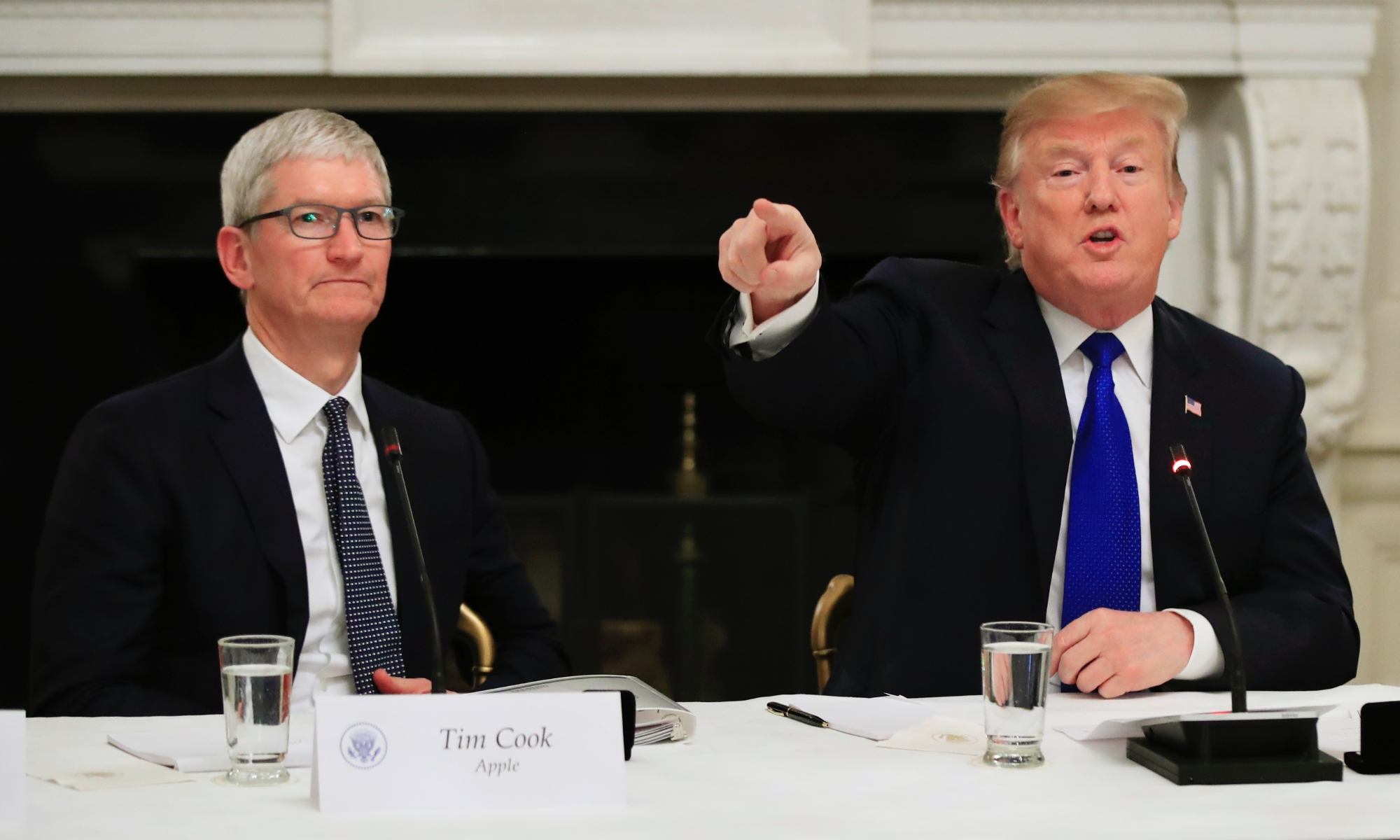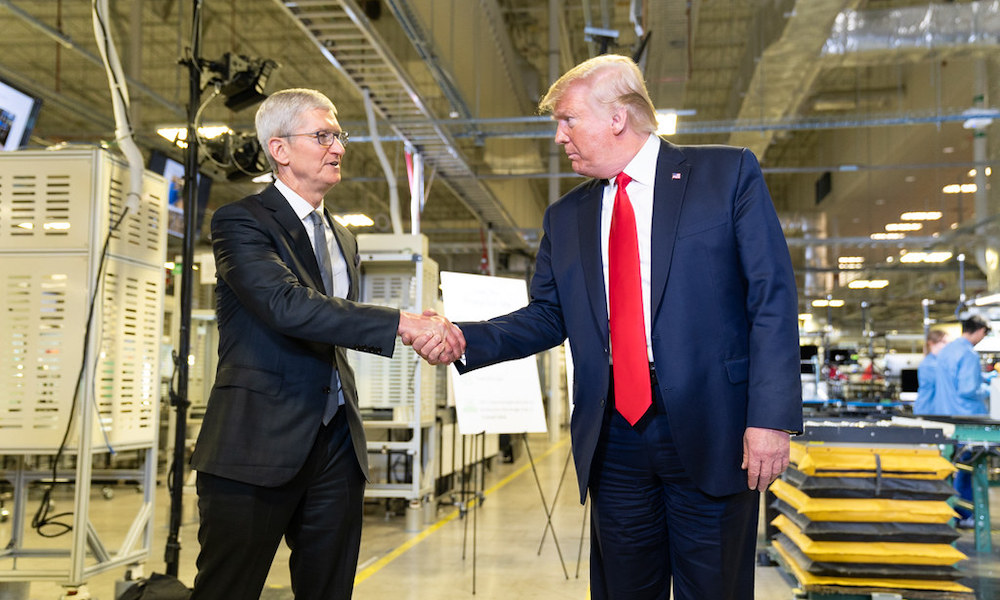Tim Cook’s ‘Very Good Relationship’ With President Trump Helped Apple Avoid Tariffs
 Manuel Balce Ceneta / Associated Press
Manuel Balce Ceneta / Associated Press
Toggle Dark Mode
Earlier this week, the Trump Administration made a surprising about-face on its China tariff policy, suddenly exempting “smartphones, computers, and other electronics” from the full wrath of the 145% “retaliatory” tariffs it had levied on imports from China.
While the move appeared to come out of the blue, it was obvious that talks had been going on behind the scenes about how these tariffs would affect US consumers. In addition to Elon Musk, who serves a dual role as one of President Trump’s trusted advisors and the CEO and co-founder of Tesla — a company with a vested interest in lower tariffs — Trump also publicly acknowledged from the Oval Office that Apple CEO Tim Cook had some hand in influencing the President’s decision.
The reprieve may turn out to be a temporary one, as Trump merely said that companies “need a little bit of time,” and the ultimate goal is still to have companies build their products in America — something he firmly believes Apple can do. However, he also said he was looking to “help some of the car companies” (which undoubtedly includes Tesla) and added, “I speak to Tim Cook” and “I helped Tim Cook recently.”
However, both President Trump and Commerce Secretary Howard Lutnick made it clear that these are not “exemptions” but rather a “recalibration” of tariffs that will move consumer electronics into a different “bucket.” Those changes will likely come in “a month or two,” Lutnick says, but it seems Apple is off the hook for now.
A new report from The Washington Post provides more insight into how Apple’s chief executive was able to “work behind the scenes.” While it’s impossible to know how much of the credit Cook deserves for President Trump’s reversal, he undoubtedly played a big part in it.
Cook maintained an amicable relationship with President Trump through his first administration, meeting and dining with him several times — something that Trump often said he respected. According to the Post, this still carries a lot of weight. Trump reportedly told venture capitalist Marc Andreessen last year that he appreciated how Cook was always willing to meet with him directly rather than working through intermediaries.
Cook’s direct and amicable approach clearly worked the last time Apple was faced with massive iPhone tariffs during the first Trump Administration. In 2019, Trump publicly stated that Cook “made a good case” against tariffs on Apple products. Over dinner, Cook explained to the President that Chinese tariffs would put Apple, a homegrown American company, at a disadvantage against its biggest foreign rival, Samsung, which makes its products in South Korea — a country that was not subject to higher tariffs the last time around.
Trump allies have described Cook as very effective in navigating the White House because he stays entirely out of the public eye when it comes to politics.
“Tim has a very good relationship with the president and rightly so. He has been playing a very careful role in that he obviously has a huge dependency on China but is also hugely important to the U.S.,” former Trump commerce secretary Wilbur Ross told the Post.
In general, [Tim Cook] has a lot of respect because he’s not a public whiner, he’s not a crybaby, but comes with the real voice of reality. It’s no surprise to me that his suggestions are being well received.
Wilbur Ross
Cook is following the same playbook with Trump’s second administration, continuing to speak with and meet with the President and other White House officials. Post sources revealed that Cook spoke to Commerce Secretary Howard Lutnick and others in the White House last week about the potential impact of tariffs on iPhone prices. Perhaps even more significantly, “he refrained from publicly criticizing the president or his policies on national television,” unlike many other executives.
It’s perhaps telling that Apple stands to benefit the most from these tariff changes compared to other tech companies, as they seem tailored to cover nearly everything that Apple makes (AirPods and HomePods are the only notable exceptions).
Nevertheless, while Trump said outright that his decision to reshuffle the tariffs was at least partly to “help” Tim Cook (and Apple), the President has also made it clear, both publicly and privately, that he won’t knuckle under to pressure “from specific corporate interests or allied industries.” Trump also refuses to use the word “exemption” as he sees it as a weakness of his first-term policies. It’s very likely the iPhone will eventually be hit with a new round of tariffs, although they might still be considerably lower than the 145% currently levied on all other products coming in from China.
“Electronics are now the subject of a Section 232 investigation, a completely separate legal authority that is not up for negotiation,” White House spokesperson Kush Desai told the Post. “The administration is taking a nuanced, strategic approach to combat China’s unfair trade practices and reshore the high-tech manufacturing that’s critical to our national and economic security back to the U.S.”
Apple has already flown in planeloads of iPhones ahead of the tariffs coming into effect, and even if this delay is only temporary, it should buy Apple enough time to stock up even more ahead of whatever the next wave will be. To be clear, Apple isn’t exempt from the baseline 20% tariffs that the Trump Administration imposed on China over the fentanyl crisis. Still, it’s much easier for Apple to weather 20% tariffs without increasing prices — at least not right away. Most analysts believe Apple will hold the line on iPhone 16 pricing, but it’s hard to predict where we’ll be by the time Apple is ready to begin shipping iPhone 17 inventory into the US.








